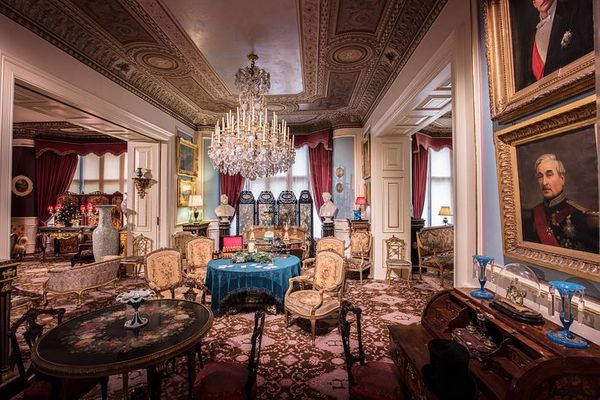4.6.1
Social Class
Different Experiences of Class in Blood Brothers
Different Experiences of Class in Blood Brothers


Purpose of the characters
Purpose of the characters
- The four main characters, Mrs. Johnstone, Mrs. Lyons, Mickey and Edward, can be seen to represent different social stereotypes, and Russell uses these characters to present his own views on social class.


How Edward and Mickey talk
How Edward and Mickey talk
- Even when Mickey and Edward first meet, there are some very noticeable differences in their class.
- While Edward speaks in standard English (Sammy calls him “friggin’ poshy”), Mickey’s language is full of slang and swear words and he has a Liverpudlian accent.
- "Mickey... if our Sammy gives y’ a sweet he’s usually weed on it first."
- "Edward: (exploding in giggles) Oh, that sounds like super fun." (Act One).


Experiences of education
Experiences of education
- Different experiences of education becomes clear as Mickey doesn't know what a dictionary is:
- "Edward: Fantastic. When I get home I’ll look it up in the dictionary."
- "Mickey: In the what?" (Act One).
- As the boys grow up, the different educational opportunities available to them because of their social class become even clearer. Edward is sent to a private boarding school, while Mickey goes to the local secondary modern.


Money
Money
- Money is, of course, a large part of class, and there is a stark contrast between the Johnstones, who can’t afford to pay the milkman, and the Lyons’, who live in “that big house on the hill” (Act Two) and can afford to employ a cleaner.
Opportunities due to Social Class in Blood Brothers
Opportunities due to Social Class in Blood Brothers
What Russell is really drawing our attention to is the lack of opportunities available to Mickey as he reaches adulthood, compared to the abundance of opportunities available to Edward.
1Context & Author
2Plot
2.1Act One
2.1.1Overview: Introduction to Mrs Johnstone & Lyons
2.1.2Analysis: Introduction to Mrs. Johnston and Lyons
2.1.3Overview: The Birth of Mickey & Edward
2.1.4Analysis: The Birth of Mickey & Edward
2.1.5Overview: Mickey Playing at Home
2.1.6Overview: Mickey & Edward as Seven-year-olds
2.1.7Analysis: Mickey & Edward as Seven-year-olds
2.1.8Overview: Mickey & Edward as Seven-year-olds 2
2.1.9Analysis: Mickey & Edward as Seven-year-olds 2
2.1.10End of Topic Test - Act One
2.1.11End of Topic Test - Act One 2
2.2Act Two
2.2.1Overview: Mickey & Edward as Teenagers
2.2.2Analysis: Mickey & Edward as Teenagers
2.2.3Overview: Mickey & Edward as Teenagers 2
2.2.4Analysis: Mickey & Edward as Teenagers 2
2.2.5Overview: Mickey & Edward as Teenagers 3
2.2.6Analysis: Mickey & Edward as Teenagers 3
2.2.7Overview: Mickey & Edward as Adults
2.2.8Analysis: Mickey & Edward as Adults
2.2.9End of Topic Test - Act Two
2.2.10End of Topic Test - Act Two 2
3Characters
3.3Linda
3.4Mrs Johnstone
3.6Mr Lyons
3.7Sammy
3.8The Narrator
3.10End of Topic Sessions
4Themes
4.1Parents & Children
4.2Growing Up
4.3Friendship & Brotherhood
4.4Fate & Superstition
4.5Nature vs. Nurture
5Literary Techniques
5.1Structure
5.2Tragedy
5.3Dramatic Irony
5.4Imagery
5.5Character & Voice
5.6Music & Lyrics
Jump to other topics
1Context & Author
2Plot
2.1Act One
2.1.1Overview: Introduction to Mrs Johnstone & Lyons
2.1.2Analysis: Introduction to Mrs. Johnston and Lyons
2.1.3Overview: The Birth of Mickey & Edward
2.1.4Analysis: The Birth of Mickey & Edward
2.1.5Overview: Mickey Playing at Home
2.1.6Overview: Mickey & Edward as Seven-year-olds
2.1.7Analysis: Mickey & Edward as Seven-year-olds
2.1.8Overview: Mickey & Edward as Seven-year-olds 2
2.1.9Analysis: Mickey & Edward as Seven-year-olds 2
2.1.10End of Topic Test - Act One
2.1.11End of Topic Test - Act One 2
2.2Act Two
2.2.1Overview: Mickey & Edward as Teenagers
2.2.2Analysis: Mickey & Edward as Teenagers
2.2.3Overview: Mickey & Edward as Teenagers 2
2.2.4Analysis: Mickey & Edward as Teenagers 2
2.2.5Overview: Mickey & Edward as Teenagers 3
2.2.6Analysis: Mickey & Edward as Teenagers 3
2.2.7Overview: Mickey & Edward as Adults
2.2.8Analysis: Mickey & Edward as Adults
2.2.9End of Topic Test - Act Two
2.2.10End of Topic Test - Act Two 2
3Characters
3.3Linda
3.4Mrs Johnstone
3.6Mr Lyons
3.7Sammy
3.8The Narrator
3.10End of Topic Sessions
4Themes
4.1Parents & Children
4.2Growing Up
4.3Friendship & Brotherhood
4.4Fate & Superstition
4.5Nature vs. Nurture
5Literary Techniques
5.1Structure
5.2Tragedy
5.3Dramatic Irony
5.4Imagery
5.5Character & Voice
5.6Music & Lyrics
Unlock your full potential with Seneca Premium
Unlimited access to 10,000+ open-ended exam questions
Mini-mock exams based on your study history
Unlock 800+ premium courses & e-books




